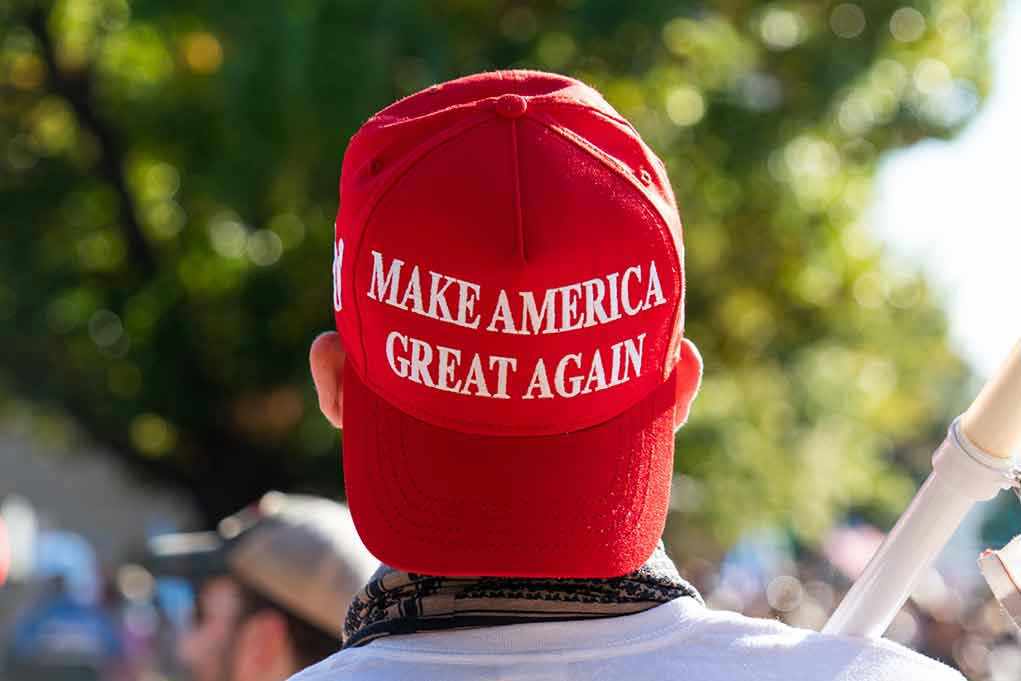
A “Trump 2028” campaign hat mysteriously appearing on the president’s desk during critical government shutdown negotiations reveals how far America’s political theater has strayed from traditional governance.
Story Overview
- Campaign merchandise suddenly appeared during official Oval Office shutdown negotiations
- House Minority Leader Hakeem Jeffries directly confronted VP JD Vance about the provocative display
- Trump escalated tensions by posting an AI-generated deepfake video mocking Democratic leaders
- The incident highlights the dangerous blending of campaign theatrics with critical government business
When Campaign Props Invade Government Business
The Oval Office meeting between President Trump, House Minority Leader Hakeem Jeffries, and Senate Minority Leader Chuck Schumer was already tense with the government shutdown. Then something unprecedented happened. A “Trump 2028” campaign hat materialized on the president’s desk during the official negotiations, transforming what should have been sober fiscal discussions into political theater.
President Donald Trump gave Schumer and House Minority Leader Hakeem Jeffries “Trump 2028” hats. The two men did not take the caps. Jeffries then turned to Vice President JD Vance and asked how he feels about that — a reference to Vance’s possible presidential ambitions. Vance… https://t.co/H7vrkGPlUW
— John Bresnahan (@bresreports) September 30, 2025
Jeffries, visibly surprised by the brazen display, turned to Vice President JD Vance with a pointed question: “Don’t you got a problem with this?” Vance’s response was tellingly evasive: “No comment.” This exchange encapsulates the broader breakdown in political norms where campaign messaging now intrudes directly into the machinery of government.
The Constitutional Question Nobody Wants to Answer
The “Trump 2028” hat represents more than campaign merchandise—it symbolizes a direct challenge to constitutional limits. The Twenty-Second Amendment explicitly prohibits presidents from serving more than two terms, yet Trump has repeatedly mused about extending his tenure. His online store began selling these hats in April 2024, signaling early campaign-style activity for what would be an illegal third term.
Trump’s public statements about a potential third term have ranged from seemingly joking to ominously serious. In late March 2024, he suggested he might seek another term, later claiming he was “not joking.” By August, he hedged, saying he would “probably not” pursue a third term. The hat’s appearance during official government business suggests this isn’t merely campaign theater—it’s a test of how far institutional boundaries can be pushed.
When AI Becomes a Political Weapon
The meeting ended without progress on averting the shutdown, but Trump wasn’t finished making his point. Shortly after the failed negotiations, he posted a vulgar, racist AI-generated deepfake video mocking Jeffries and Schumer. This marked a new low in presidential discourse—using artificial intelligence to create demeaning content targeting political opponents during a national crisis.
Jeffries condemned the video as a “malignant distraction,” but the damage was done. Trump had successfully shifted attention from substantive policy discussions to sensational content designed to dominate news cycles. The use of AI-generated content by a sitting president represents an unprecedented weaponization of technology against democratic opposition leaders.
The Price of Political Theater During Crisis
While Trump orchestrated his multimedia spectacle, federal employees hunker down for a government shutdown. The contrast couldn’t be starker—campaign hats and deepfake videos while essential services face disruption. This incident exemplifies how modern political theater prioritizes viral moments over governing competence, leaving real-world consequences for ordinary Americans.
The erosion of boundaries between campaigning and governing threatens the basic functioning of American democracy. When Oval Office meetings become venues for campaign messaging and AI-generated attacks, the system’s ability to address genuine crises deteriorates. What should have been focused negotiations on keeping the government running devolved into provocative displays and personal attacks, ensuring the shutdown continued while political points were scored.




